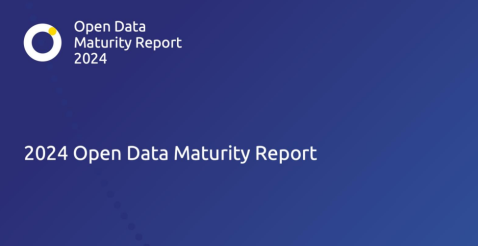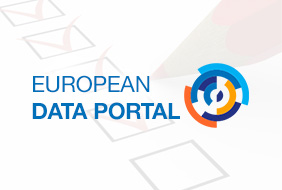Spain, one more year among the trend-setting countries in open data
Fecha de la noticia: 19-12-2024

The European data portal, data.europa.eu, has published the Open Data Maturity Index 2024, an annual report that assesses the level of open data maturity of European countries.
The 34 participating countries, including the 27 EU Member States, four candidate countries (Bosnia and Herzegovina, Albania, Serbia and Ukraine) and three European Free Trade Association countries (Iceland, Norway and Switzerland) were surveyed.
In this year's edition, Spain obtains an overall rating of 95% out of 100%. This places it in sixth place overall. As reflected in the following image, for yet another year, Spain is in the group of so-called trendsetter countries (trendsetter) , which are those with the best scores in the ranking, and which also include France, Poland, Ukraine, Slovakia, Ireland, Lithuania, Czech Republic, Italy, Estonia and Cyprus.

Figure 1: Groups of participating countries according to their overall open data maturity score.
Above the EU27 average in all four dimensions analysed
The Policy Dimension, focusing on open data policies in different countries, analyses the existence of national governance models for open data management and the measures that have been put in place to implement existing strategies. In these aspects, Spain scored 96% compared to the European average of 91%. The most positive aspects identified are:
- Alignment with European policies: The report highlights that Spain is fully aligned with the European Open Data Directive, among other recent data-related regulations that have come into force.
- Well-defined action plans: It highlights the strategies deployed in different public administrations focused on incentivising the publication and re-use of data generated in real time and data from citizens.
- Strengthening competences: It focuses on how Spain has developed training programmes to improve the skills of civil servants in managing and publishing open data, ensuring quality standards and fostering a data culture in public administration.
The Impact Dimension analyses the activities carried out to monitor and measure both the re-use of open data, and the impact created as a result of this re-use. Year after year, this has been the least mature dimension in Europe. Thus, compared to an EU average of 80%, Spain obtains a score of 100% for the development of numerous actions, among which the following stand out:
- Multi-sectoral collaboration: The report highlights how our country is presented as an example of interaction between public administrations, private companies and civil society, materialized in examples such as the close ties between the public sector and the Multisectoral Association of Information (ASEDIE), which produces year after year the ASEDIE report on the reuse of public sector information.
- Examples of re-use in key sectors: It shows how Spain has promoted numerous cases of open data reuse in strategic areas such as the environment, mobility and energy.
- Innovation in communication: The document highlights the effort invested in innovative communication strategies to raise public awareness of the value of data, and especially young audiences. Also noteworthy is the production of podcasts featuring interviews with open data experts, accompanied by short promotional videos.
The Portal Dimension focuses on analysing the functionalities of the national platform to enableusers to access open data and interact within the community. With 96% compared to 82% in the EU27, Spain is positioned as one of the European benchmarks in improving user experience and optimising national portals. The highlights of the report are:
- Sustainability and continuous improvement: According to the report, Spain has demonstrated a strong commitment to the sustainability of the national open data platform (datos.gob.es) and its adaptation to new technological demands.
- Interaction with users: One of the great strengths is the active promotion from the platform of the datasets available and of the channels through which users can request data that are not available in the National Catalogue.
Finally, the Quality Dimension examines the mechanisms for ensuring the quality of (meta)data. Here Spain scores 88% compared to 79% in the EU. Spain continues to stand out with initiatives that ensure the reliability, accessibility and standardisation of open data. Some of the strengths highlighted in the report are:
- Metadata automation: It highlights the use of advanced techniques for automatic metadata collection, reducing reliance on manual processes and improving accuracy and real-time updating.
- Guidelines for data and metadata quality: Spain provides many practical guidelines to improve the publication and quality of open data, including anonymisation techniques, publication in tabular formats (CSV) and the use of APIs.
Continuing to innovate to maintain Spain's advanced position in open data maturity
While Spain continues to stand out in the EU thanks to its open data ecosystem, efforts must continue. To this end, the same report identifies lines of work for countries, such as Spain, that seek to maintain their advanced position in open data maturity and to continue innovating. Among others, the following recommendations are made:
- Consolidating open data ecosystems: Strengthen thematic communities of providers and re-users by prioritising High Value Datasets (HVDs) in their development and promotion.
- Promoting coordination: Align the national strategy with the needs of agencies and local authorities.
- Develop country-specific impact metrics: Collaborate with universities, research institutions and others to develop impact assessment frameworks.
- Measure and disseminate the impact of open data: Conduct regular (annual or biannual) assessments of the economic, environmental and social impact of open data, promoting the results to generate political support.
- Facilitate the participation of the open data community: Ensure that providers improve the publication of data based on user feedback and ratings.
- Increase the quality of data and metadata: Use automated tools and validations to improve publication standards, including adopting artificial intelligence technology to optimise metadata quality.
- Promote successful reuse cases: Publish and promote success stories in the use of open data, interact with providers and users to identify innovative needs and applications.
Overall, the report shows good progress on open data across Europe. Although there are areas for improvement, the European open data landscape is consolidating, with Spain at the top of the table. Read here the complete Open Data Maturity Index 2024.














